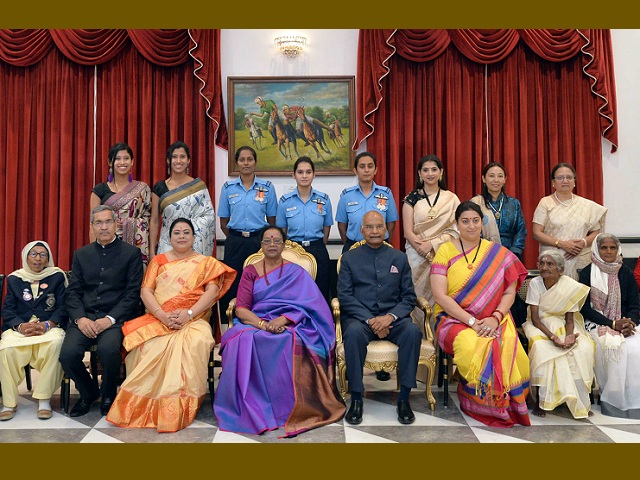NARI SHAKTI PURASKAR
- The Ministry of Women and Child Development of the Government of India annually bestows the Nari Shakti Puraskar (literally, “Woman Power Award”) on individuals or organisations that advance the cause of women’s empowerment.
- On March 8th, International Women’s Day, the awards are given out at Rashtrapati Bhavan in New Delhi by the President of India.
- The Stree Shakti Puraskar Awards were established in 1999, and in 2015, they underwent a name change and organisational overhaul.
- There are six institutional categories and two individual categories, each with a cash award of Rs. 2 lakh and Rs. 1 lakh.
- It was created in 1991 and is the highest civilian honour for women in India. Every year on March 8th, International Women’s Day, the President of India awards recipients of the NARI SHAKTI PURASKAR to recognise their exceptional and outstanding contributions to the economic and social empowerment of women.
- The Nari Shakti Puraskar is awarded yearly on March 8 in honour of International Women’s Day.
- Among the 39 recipients of awards in 2017, Navika Sagar Parikrama – INSV Tarini Team was one.

It may be given to people, teams, organisations, or NGOs who have:
- encouraged women to take up roles involving decision-making.
- encouraged the development of women’s skills in both traditional and non-traditional fields.
- provided rural women with essential facilities.
- promoted women in fields such as sport, art, and culture, as well as science and technology.
- worked diligently to improve women’s safety and security, education, health, and wellness, among other things.
Categories
Six institutional categories and two individual categories for women are available for the Nari Shakti Puraskar.
Institutional classifications:
- Each of the six institutional classifications bears the name of a notable lady from Indian history.
- For the best private sector organisation or public sector effort in advancing the welfare and well-being of women, the Devi Ahilya Bai Holkar Award is given. named after Ahilyabai Holkar, a monarch of the Malwa kingdom who lived in the 18th century.
- The Kannagi Devi Award is given to the state with the greatest improvement in the child sex ratio (CSR). It was given the name Kannagi after the main character in the Tamil epic Silapathikaram.
- The Mata Jijabai Award recognises the top urban local organisation for supporting women’s needs. named in honour of Mata Jijabai, Shivaji’s mother, who established the Maratha Empire in the seventeenth century.
- A civil society organisation (CSO) performing exceptional work for the welfare and well-being of women is presented the Rani Gaidinliu Zeliang Award. named after Rani Gaidinliu, a Naga spiritual and political figure from the 20th century
- The best organisation for research and development in the area of women’s empowerment receives the Rani Lakshmi Bai Award. named after Lakshmibai, a Jhansi queen and one of the main leaders of the Indian Rebellion of 1857.
- Two District Panchayats and two Gram Panchayats received Rani Rudramma Devi Awards for their contribution in the area of women’s welfare, particularly in relation to the Beti Bachao, Beti Padhao Yojana. named after Rudrama Devi, a monarch of the Deccan Plateau in the 13th century.
Certain Categories :
- Award for bravery and strength
- Awards recognising remarkable achievements in women’s endeavour, volunteerism, social change, or women’s empowerment.
- The Stree Shakti Puraskar, which was established in 1999, was the forerunner of the Nari Shakti Puraskar. It came with a citation and a cash prize of $100,000. The six categories for the Nari Shakti Award were also used for the Stree Shakti Puraskar.
- Madurai Chinna Pillai was recognised in 1991 for her work in starting and growing the microcredit movement and improving the lives of poor women. When handing her the prize, the former prime minister Atal Bihari Vajpayee knelt down and touched her feet as a show of respect.
In summary, it will support the emancipation of women in conventional society.
